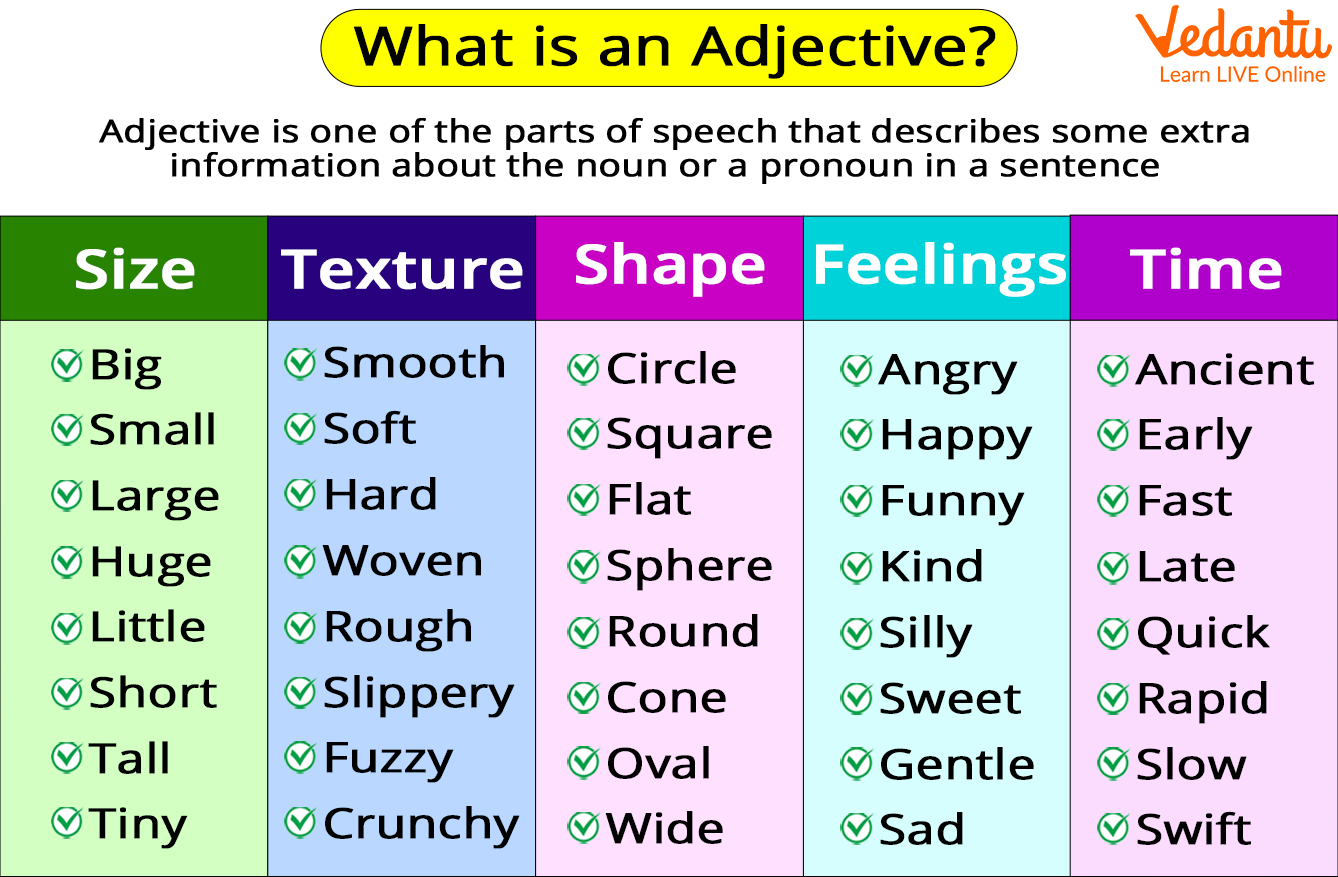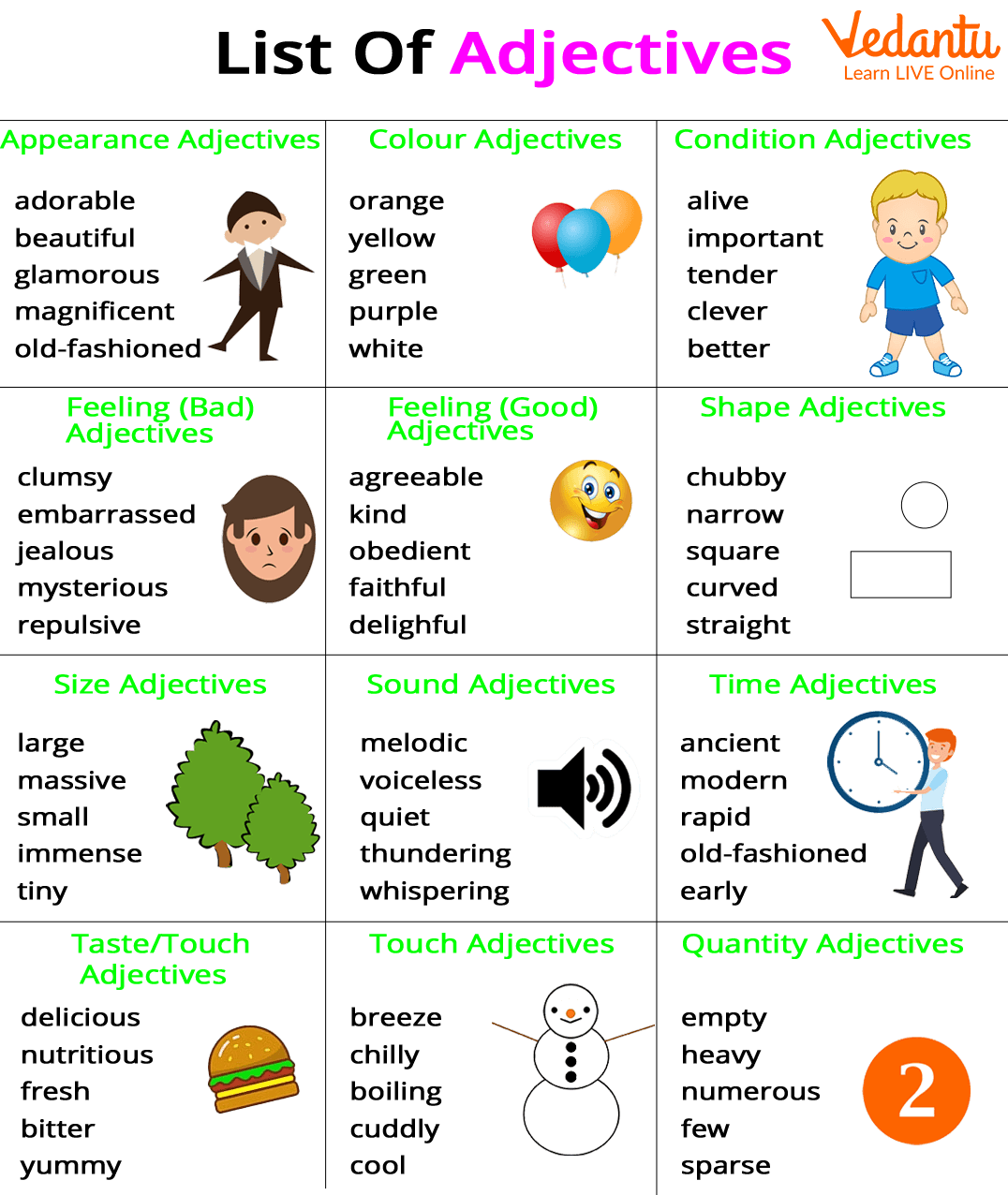




What Are Big and Small Adjectives? Key Examples and Uses
Adjectives are words that describe or provide more information about nouns and pronouns. For example, adjectives like red, quick, happy, and annoying can describe things like a red hat, a quick rabbit, a happy duck, and an annoying individual.
When we add a suffix to a noun or verb, we get certain common adjectives. When the suffix -ful is added to the noun ‘beauty’, the adjective ‘beautiful’ is created, and when the suffix -able is added to the verb ‘read’, the adjective ‘readable’ is created.
Similarly, -al, -ary, -able and –ible, –ish, -ic, -ical, -less, -like, -ous, -some, and -y are all common suffixes for adjectives. Some adjectives are participles (verbs ending in -ed or -ing), while others are not derived from nouns or verbs but are unique in their own right, such as near, deep, and slow. Learn more about adjectives by reading through the following content.

Examples of adjectives
More on Adjectives and their Types
Adjectives are commonly thought of as words, although they are phrases or clauses that can be used adjectivally. The phrase ‘wearing a hat’ modifies the noun man in the sentence "The man wearing the hat winked at me." Hence, it is an adjective phrase. In the sentence "The man, who was carrying a book, winked at me," the clause ‘who was carrying a book’ is an adjective clause since it modifies the noun ‘man’.
Descriptive adjectives are used to describe the qualities of a noun. The word beautiful is a descriptive adjective in the sentence "My friend is a beautiful model."
Quantitative adjectives describe ‘how much’ of the noun there is. In the sentence, "She has a lot of friends," ‘a lot of’ is a quantitative adjective.
The importance of the word and whether it is near or far is highlighted with demonstrative adjectives. The word ‘that’ is a demonstrative adjective in the line "I want that vase."

List of adjectives
Big and Small Adjectives
Now, we're going to increase your vocabulary of adjectives that define size by providing you with a lot more words to describe huge and little items. To begin, we'll list some synonyms for the words "big" and "small," and offer some instances of how to use these adjectives so you can see how they're used in context.
Synonyms for Small Adjectives
Little, diminutive, dinky, fine, half-pint, Lilliputian, pint-size (or pint-sized), pocket, puny, pygmy, bantam, shrimpy, slight, smallish, subnormal, dwarfish, toylike, undersized (also undersize), and pocket-size (also pocket-sized).
Small-Related Words
Dwarf, toy runtish, minikin, runty, scrubby, inappreciable, infinitesimal, little bitty, micro, microscopic (also microscopical), mini, miniaturised, minim, minuscule, minute, pinpoint, miniature, stunted bitty, teensy, teensy-weensy, teeny, teeny-weeny, tiny, wee, weeny (also weensy).
Synonyms for Big
Weighty, consequential, earth-shattering, eventful, historic, important, major, material, momentous, monumental, much, earthshaking, significant, substantial, tectonic, material, meaningful.
Words Related to Big
Fatal, fateful, strategic, decisive, grave, heavy, serious, sincere, earnest, distinctive, exceptional, impressive, outstanding, remarkable, prominent, preeminent, valuable, worthwhile, worthy.
Eminent, great, illustrious, noble, notable, noteworthy, outstanding, distinguished, prestigious, famous, notorious, renowned.
All-important, critical, crucial, essential, key, seminal, vital, central, pivotal.
Importance of Adjectives
An adjective is a word that transforms a describing noun or pronoun into a more descriptive noun or pronoun. For example, the object "man" becomes "the tall, lovely man" or "the short, plain man" when the adjective is expanded.
The articles "a, an," and "the" are also used as descriptive nouns. Although "a" and "an" are referred to as "uncertain articles" because they do not refer to a specific person or thing. Since it refers to a certain person or thing, "the" is referred to as a specific article.
It also provides a descriptive idea of the same noun, allowing us to determine the right meaning and state of the article. The meaning of a sentence is completely influenced by the adjective. Its existence adds to the sentence's intrigue.
Conclusion
We hope you have understood what adjectives are and how they are used. You can now expand your vocabulary of adjectives on small and big by taking a note of all the synonyms we have discussed here. To enhance your knowledge of other parts of speech in English grammar, head over to our website today!
FAQs on Big and Small Adjectives: How to Describe Size Effectively
1. What are the adjective rules?
Multiple adjectives are always rated in the following order: opinion, size, age, form, colour, origin, substance, and purpose. Unlike many other grammar or syntactic rules, this one is practically unbreakable, even in casual speech.
2. What distinguishes the adjective little from others with comparable meanings?
Small adjectives are also known by the terms diminutive, little, miniature, minute, and tiny. While all of these phrases indicate "much smaller than average," small and little are sometimes interchanged, but small refers to relative size as assessed by capacity, value, and number.















